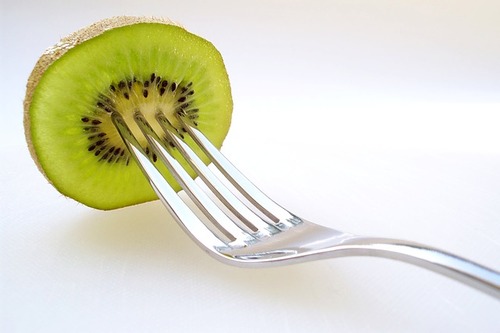Are Kiwis Bad For You?
Also Known As: Chinese gooseberry, kiwifruit
Short answer
Unless you are allergic, are about to have surgery, or are taking Warfarin (Coumadin), kiwis are hard to beat as one of nature's healthiest fruits and sources of important nutrients.
Very healthy and numerous health benefits. A few harmful qualities may be associated, but only under certain circumstances such as an allergic reaction.
View Full Grading System
Category 'A'
Very healthy and numerous health benefits. Side effects are rare. Things rated an 'A+' are typically necessary for survival (for example, water).
Very healthy and numerous health benefits. A few harmful qualities may be associated, but only under certain circumstances such as an allergic reaction.
Very healthy and numerous health benefits. Harmful qualities may be associated, but aren't usually serious.
It is important to note that even the best things in life can become bad in immoderate amounts. So, although something may be rated an 'A+', overconsumption/overdoing can bring unwanted effects.
Category 'B'
Very beneficial to your health. Things rated a 'B+' may have a few harmful qualities to pay attention to.
Overall beneficial to your health. Things rated a 'B' may have some harmful qualities to pay attention to.
More beneficial to your health than not. However, harmful qualities are most likely associated and shouldn't be overlooked.
The main difference between category 'A' and category 'B' is the harmful qualities typically present in 'B' items. Serious side effects are usually uncommon, but are still possible and should be taken note of.
Category 'C'
Both beneficial and harmful qualities associated. Things rated a 'C+' are typically a bit more on the beneficial side. Still, moderation is important.
A fairly even ratio of beneficial and harmful qualities. Moderation is important. Very general topics that can lean towards both sides of the spectrum will be placed here as well. Rice, for example, can be good or bad depending on the type.
More harmful than beneficial. Side effects are common, especially when consumed/done excessively. Moderation is very important.
Category 'C' usually denotes to both good and bad qualities. When it comes to this category, it is important to keep this word in mind: moderation.
Category 'D'
Harmful to your health. Although benefits may be associated, the bad most likely outweighs the good. Moderation is very important.
Harmful to your health. A few benefits may be associated, but the bad outweighs the good. Moderation is extremely important.
Harmful to your health. Very few, if any, benefits are present. Things in this category should be avoided as much as possible.
Category 'D' is typically for things that are more harmful than beneficial. While consuming/doing something unhealthy once in a blue moon shouldn't hurt, we definitely recommend eliminating 'D' items as a regular part of your routine/diet.
Category 'F'
Category 'F' is for things that fail to bring anything beneficial to the table, and are very harmful to your health. We recommend completely avoiding anything in this category. Long-term side effects of 'F' items are usually very serious.
Category 'N'
'N' stands for neutral. Things placed into this category are generally (a) neither good nor bad for you, or (b) lack the necessary evidence to reach any conclusions.
Long answer
Small as they are, kiwis pack quite the nutritional punch. Assuming a serving size of two medium-sized kiwis, the benefits of enjoying this delicious fruit are enormous. Vitamin C is found in an abundance - almost twice as that of oranges. This vitamin helps boost immunity, combat stress and aging, and promotes iron absorption. Vitamin E, also important as an antioxidant and immune system booster, has the added effect of helping to lower cholesterol. Kiwis are also high in serotonin - a chemical that aids in having a good night's sleep, being alert in the morning, and learning. It also helps regulate your appetite, so eating kiwis is a good way to stock up on nutrients and avoid overeating.
Magnesium, essential for our nerves and muscles to function properly, are also found in abundance. Additionally, there is 20% more potassium in a kiwi than in a banana. Kiwis are also high in fiber and contain actinidin (an enzyme that aids in digestion), and are therefore good to consume to keep the digestive system regular and healthy.
Yet another benefit of eating kiwis is that they have been shown to promote healthy breathing and in fact have been used in asthma treatment. As an alkaline fruit, kiwis also help keep the body's acidity/alkaline levels balanced.
There must be something bad, right? Well, it depends. If you are allergic to avocado, birch pollen, hazelnut, poppy seeds, figs, latex, sesame seeds, rye, or wheat, you may also have a kiwi allergy. Symptoms of being allergic to kiwis include trouble swallowing, hives, and vomiting.
Also, kiwis contain a high amount of vitamin K. While vitamin K (particularly K2) is necessary for the transport of calcium, it may also have a negative impact if you are taking Warafin as it is involved in blood clotting. It is also generally recommended to not eat kiwis for at least two weeks prior to surgery as doing so may slow down the process of blood clotting.
Possible short-term side effects
Ingredients to be aware of
Benefits
- protects against cancer
-
fights asthma
-
aids in learning and memory
-
helps with restful sleep
-
promotes healthy digestion
-
can be enjoyed by diabetics
-
improves nerve / muscle function
-
fights stress / aging
-
boosts immune system
Please turn your Ad Blocker off to see this content. Thank you!
Thank you for your feedback!
Written by Jeff Volling
Published on: 12-28-2015
Last updated: 12-10-2016
Thank you for your feedback!
Written by Jeff Volling
Published on: 12-28-2015
Last updated: 12-10-2016

 Approved by
Approved by 















